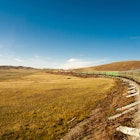
Aug 27, 2020 โข 2 min read

Aug 2, 2022 โข 5 min read

ฐญฐ๙ฒนฐ์รณทษโs extensive network of trams provides a great way to get around the city โ and see monuments like the medieval Barbican along the way ยฉ Longfin Media / Shutterstock
Much of what visitors want to see in ฐญฐ๙ฒนฐ์รณทษ is found within the largely pedestrianized streets of its historic Old Town. That makes this city a place best explored on foot.
But youโd be missing out if you didnโt jump on ฐญฐ๙ฒนฐ์รณทษโs famous trams to eat and drink in some of the more interesting neighborhoods, like Kazimierz and ฑสดวปๅฒตรณฐ๙ณ๚ฑ๐. And in summer, the water tram is a must.
In between strolls, hereโs how to get around in ฐญฐ๙ฒนฐ์รณทษ.
ฐญฐ๙ฒนฐ์รณทษโs covers just about every inch of the city. With more than 20 lines and around 400 stops, you can get to within five minutes of every sight, bar and restaurant โ a convenience especially welcome in deep winter. The frequency of the stops and the fact the tracks share the road with cars in the congested center mean the tram isnโt especially fast. Still, the slow speed and big windows make for an atmospheric way to take in the city.
Trams on the busiest routes run every couple of minutes from around 5am to 11pm; after that, limited services run on a handful of night tram routes. Information in English is good โ but beware of road construction, which disrupts services and causes frequent diversions. If you see the word objazd (diversion) on the timetable or tram, ask a friendly Pole for help.

ฐญฐ๙ฒนฐ์รณทษโs trams cover just about everywhere you could want to go and are usually faster than the bus. Still, buses run more frequently at night and are convenient for reaching some out-of-town destinations, like Auschwitz.
Tickets for buses and trams are interchangeable and work on a timed basis. You can use as many buses or trams as you need during the ticketโs validity.
For most trips, including the Old Town to Kazimierz, the cheapest 20-minute ticket (4zล) will suffice. Buy a 60-minute ticket for 6zล for trips further afield, including to ฑสดวปๅฒตรณฐ๙ณ๚ฑ๐, Bagry Lake and Nowa Huta. There are also good-value 24-, 48- and 72-hour transport passes.
You can buy tickets at the vending machines at many stops or inside buses and trams (some only take cash), as well as at newsstands and kiosks. Make sure you stamp your ticket on board at one of the machines โ if you donโt, you might face a fine from plain-clothed inspectors.
The train is the most comfortable option from ฐญฐ๙ฒนฐ์รณทษ airport, but unhelpfully runs only every 30 minutes. Buses run in between train departures, so depending on when your flight arrives it may be more convenient to hop on a coach. The train takes 20 minutes to ฐญฐ๙ฒนฐ์รณทษ Gลowny station, and while the bus takes longer (30โ50 minutes) it may get you closer to your hotel.
There are trains every hour from ฐญฐ๙ฒนฐ์รณทษ to Auschwitz (Oลwiฤcim in Polish), but itโs then an additional 2km walk or shuttle ride to reach the camp. Buses from ฐญฐ๙ฒนฐ์รณทษโs main bus station are faster (90 minutes) and drop you off right at the campโs entrance.
Many tours to Auschwitz include transport โ these are heavily advertised in ฐญฐ๙ฒนฐ์รณทษ, but expensive. The museum is well set up for independent visits, with English-language information throughout. You can also pay to join a guided tour once you reach the site.

Completely impractical for seeing the main sights, the slow and not especially frequent is still ฐญฐ๙ฒนฐ์รณทษโs most enjoyable ride. Operating from June to September, this boat service lets you take a short 30-minute ride along the Vistula River, offering pretty views of Wawel Castle along the way. There are usually half a dozen departures daily, with tickets just 15zl.
Better is the daily one-hour cruise upstream to the 1000-year-old Tyniec Monastery. This excursion takes you along a wild stretch of the Vistula, through forested woodlands and by steep limestone cliffs. Youโll have an hour to meet the sociable monks and eat in the excellent restaurant before your return trip.
Frustratingly, you can only buy tickets on board the boat โ so arrive early, especially for the Tyniec departure. Look for the Tramway Wodny signs, and avoid flashier rivals at the waterfront that have bigger signs and better English but charge twice the price.
There are frequent onward train connections to surrounding capitals from ฐญฐ๙ฒนฐ์รณทษ on modern Intercity trains with cheap advance tickets. The night trains to Budapest and Prague are an excellent way to reduce your carbon footprint.
Ticket machines in ฐญฐ๙ฒนฐ์รณทษ Gลowny have English-language information, as does the .

There are hourly trains between Warsaw and ฐญฐ๙ฒนฐ์รณทษ, with the journey taking under three hours. You can choose between more expensive (and faster) Express Intercity trains, or cheaper but slower Intercity and regional Tanie Linie Kolejowe.
There are both day trains or an overnight sleeper between Prague and ฐญฐ๙ฒนฐ์รณทษ (7โ9 hours). The train has comfortable carriages, often with wi-fi and power sockets. By day, the restaurant car serves draft Pilsner.
The daily overnight sleeper between Budapest and ฐญฐ๙ฒนฐ์รณทษ (9 hours) is an economical option โ not to mention a sociable way to meet fellow travelers. The modern and comfortable trains are slightly faster by day.
ฐญฐ๙ฒนฐ์รณทษโs Old Town is charmingly cobbled, and those stones do get slippery when it rains or snows.
Most trams and buses on popular routes have newly made cars that offer low-level access for wheelchairs using an automated ramp through wide, well-signposted doors. In some places, trams stop on the road, meaning you need to board by coming off the curb (there is usually an accessible curb cut). All public transport has clear, usually digital signs indicating the next stops and audio announcements.
For more information on accessible travel check out ภฯฐฤรลม๙บฯฒสฟชฝฑผวยผโs .


Aug 27, 2020 โข 2 min read

Jul 14, 2020 โข 2 min read


Dec 2, 2024 โข 6 min read

Nov 29, 2024 โข 7 min read



